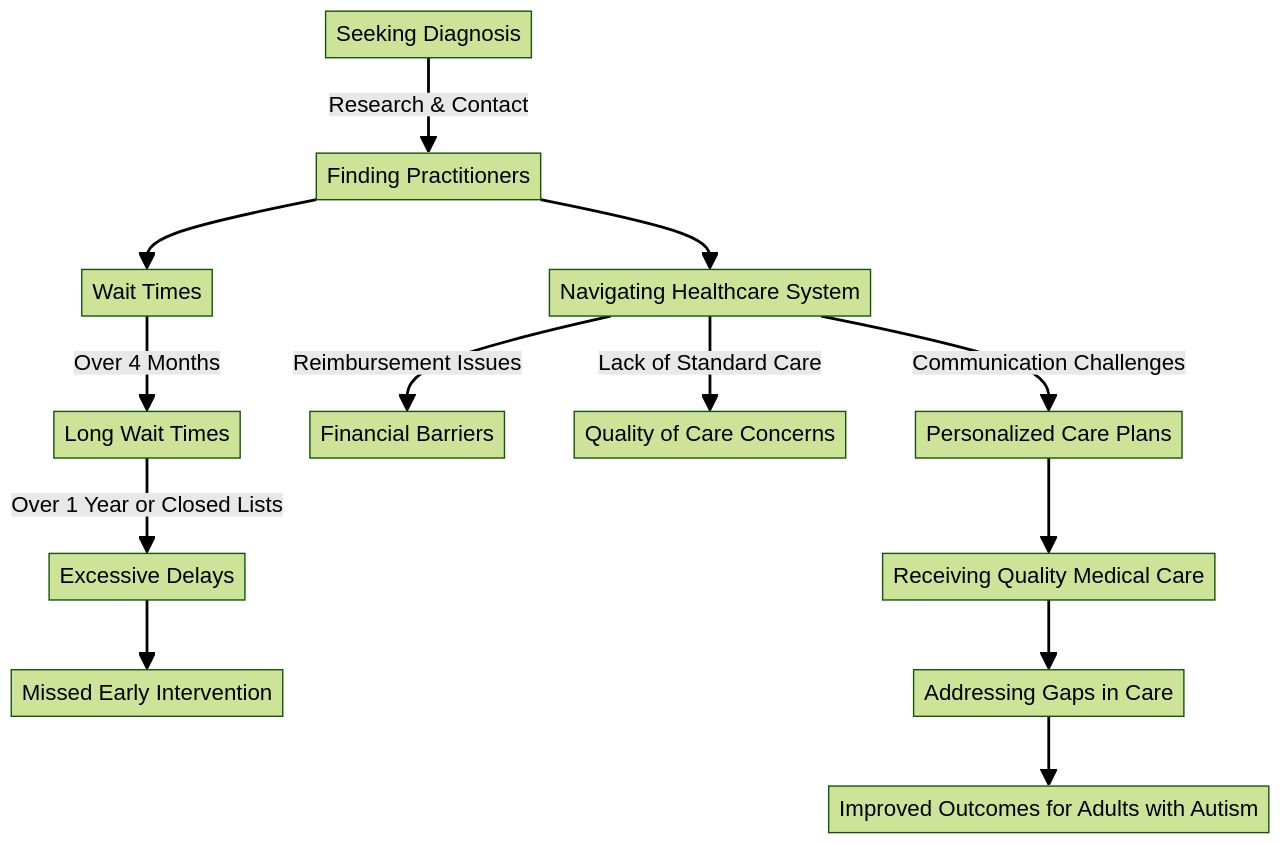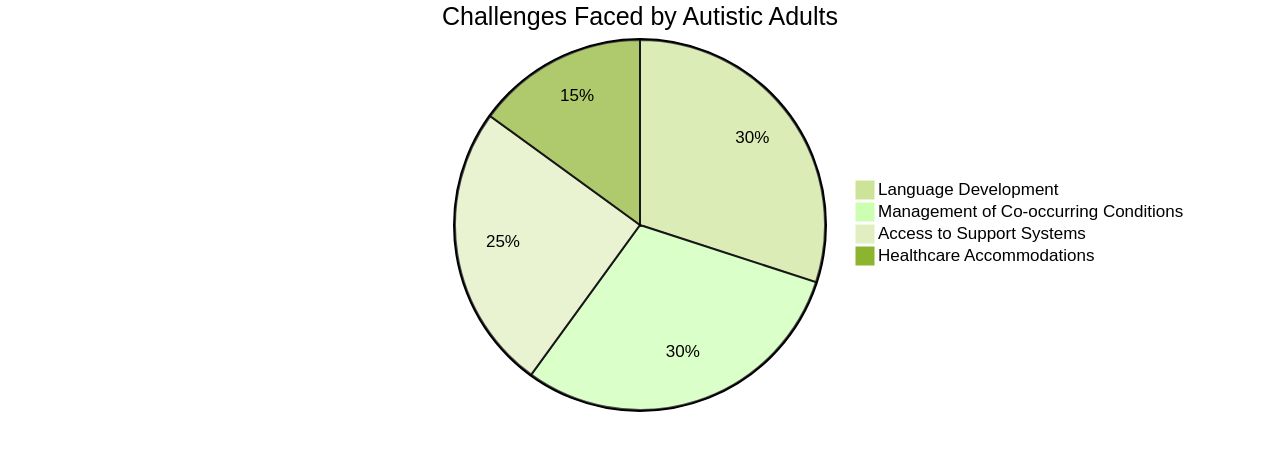Introduction
The transition into adulthood poses unique challenges for individuals on the autism spectrum, particularly when it comes to accessing healthcare services tailored to their needs. A study involving adults diagnosed with autism later in life reveals their priorities for support, emphasizing the need for localized services, professional training, and personalized care plans.
Unfortunately, many adults with autism report difficulties finding practitioners willing to include them in their caseloads. Supporting this, statistics show that autistic adults have the lowest employment rate among people with disabilities, limiting their access to healthcare through employer benefits.
In addition, they face extensive wait times for diagnosis and services. Harvard Medical School's Adult Autism Health Resources initiative seeks to address these gaps in care by educating clinicians and self-advocates on improving the lives of autistic adults and their families. This article explores the importance of accessing support and services for autism, focusing on the role of autism centers in providing comprehensive support and the impact of locating an autism center near you. It also highlights the need for community engagement and support networks beyond therapy.
Understanding the Importance of Accessing Support and Services for Autism
The transition into adulthood poses unique challenges for individuals on the autism spectrum, particularly when it comes to accessing healthcare services tailored to their needs. A study involving 43 adults diagnosed with autism later in life revealed their priorities for support, emphasizing the need for localized services, professional training, and personalized care plans.
Unfortunately, many adults with autism report difficulties finding practitioners willing to include them in their caseloads, despite the fact that their therapeutic needs for conditions like anxiety and depression often mirror those of neurotypical individuals. Supporting this, statistics show that autistic adults have the lowest employment rate among people with disabilities at 58%, limiting their access to healthcare through employer benefits.
In addition, they face extensive wait times for diagnosis and services, averaging four years, with marginalized groups experiencing even longer delays. Harvard Medical School's Adult Autism Health Resources initiative, supported by the Nancy Lurie Marks Family Foundation, seeks to address these gaps in care by educating clinicians and self-advocates on improving the lives of autistic adults and their families. As underscored by the former president of the Ontario Autism Coalition, Laura Kirby-McIntosh, the discontinuation of critical services leaves many families in distress, searching for viable alternatives. The initiative by Harvard Medical School serves as a vital step toward acknowledging the needs of the existing adult autistic population and ensuring they receive quality medical care on par with neurotypical individuals.

The Role of Autism Centers in Providing Comprehensive Support
Discovering an autism diagnosis in adulthood can be a pivotal moment, offering both challenges and opportunities. Centers specializing in autism provide a crucial service in this journey, offering not just evaluations but also ongoing support and interventions.
These centers boast an interdisciplinary team of experts, such as psychologists, therapists, and medical professionals, who work collaboratively to create individualized care plans. With services ranging from therapy sessions to educational workshops, these centers are dedicated to enhancing the life skills and social competencies of autistic individuals.
Recent studies underscore the importance of timely intervention, revealing that children diagnosed by age 4 are fifty times more likely to receive essential services. Yet, disparities persist in diagnosis rates, with White and Black children identified more frequently than Hispanic children, and boys diagnosed approximately four times more than girls.
This points to the necessity for centers to address barriers like stigma and limited access to healthcare that hinder early identification, particularly for Hispanic children and children of color. Inclusivity and continued support into adulthood are also critical.
CAST, for example, provides comprehensive care for transitioning adults with autism, aiming to integrate best practices across healthcare settings. They report that adults with autism involved with the program have a 10% higher continuity of care compared to national samples and are more likely to receive preventive services.
This integrated approach, along with training programs for future medical professionals, exemplifies the evolving landscape of autism care. The strengths-based approach, which focuses on the unique abilities and potential of individuals with autism, is gaining traction. Therapy that builds on strengths such as exceptional memory, attention to detail, and deep subject matter expertise can empower autistic individuals to thrive. As Dr. Valerie Gaus notes, autistic adults face similar life transitions as their peers, albeit with distinct challenges. With proper support and understanding, they can navigate adulthood successfully. The willingness of practitioners to adapt and include autistic patients in their caseloads is essential, as many report being turned away due to a lack of specialized training.

Case Study: The Impact of Locating an Autism Center Near Me
Navigating adulthood with autism can present unique challenges, as evidenced by the experiences of Ben, a 23-year-old from Toronto. Despite the comfort of the animals at Horsebarn Hill, Ben's family sought the expertise of Assistant Professor Lindsay Butler, a specialist in language development for minimally verbal young adults with autism. Butler's research is pivotal, filling a void in autism therapy and services for this demographic, especially as they transition into adulthood.
This need is further underscored by the story of Ben's mother, Natalie, who left her job to find supportive resources for Ben Post-adulthood. Her search led to Butler's work, which stands out for its focus on language development in older children and young adults. The importance of clear and direct communication is crucial for neurodivergent individuals, particularly those with autism.
Creating an environment where team members can openly discuss their needs and preferences without ambiguity is essential. This approach is not only beneficial in academic and therapeutic settings but also in healthcare environments. For instance, Mercy Hospital in Oklahoma City is training its emergency staff to better accommodate autistic patients, addressing sensory overload and providing sensory kits to ease the stress of emergency room visits.
Recent studies highlight the complexity of autism, showing that the condition is not only prevalent (diagnosed in 1 in 36 children and 2.2% of adults) but also that the timing of diagnosis has little impact on overall quality of life. This insight is vital in understanding that access to support systems and knowledge about autism can significantly affect health services utilization and the management of co-occurring conditions like asthma, which is commonly found in autistic children. The need for continuity of care and specialized preventive care is critical to avoid hospital admissions and ensure the well-being of individuals with autism.

Accessing Services Beyond Therapy: Community Engagement and Support Networks
Autism, a neurodevelopmental disability, affects an estimated 2.2% of adults, presenting unique social, communication, and behavioral challenges. Comprehensive support for adults receiving an autism diagnosis is crucial, yet often overlooked.
Research co-designed with autistic adults reveals that personalized support plans, professional training, and assistance in processing a late diagnosis are top priorities. These findings underscore the importance of community-oriented services beyond therapy, such as workshops and support groups offered by autism centers.
These initiatives not only aid in social integration but also provide a platform for sharing experiences and strategies, fostering a sense of belonging and reducing isolation. Valuable insights from over 1,200 community members, including the breadth of challenges across the autism spectrum, have informed the IACC Strategic Plan Update, highlighting the need for varied, personalized supports.
Autistic adults express the significance of mental health and employment services in adulthood, with those engaged in mental health counseling more likely to work full-time and actively participate in their communities. As the autism diagnosis spectrum broadens to include more children without intellectual disabilities, there's an increasing call for equitable, diverse support systems. This includes training for businesses to become autism welcoming and innovative supported-living arrangements for autistic adults with high needs, as seen in the partnership between parents and local councils in the UK. These efforts are crucial in addressing the disparities autistic individuals face and in providing a supportive environment that caters to their diverse needs.

Conclusion
In conclusion, accessing support and services for individuals with autism during their transition into adulthood is crucial. The study emphasized the need for localized services, professional training, and personalized care plans.
However, many autistic adults face difficulties finding practitioners willing to include them in their caseloads, leading to limited access to healthcare. Harvard Medical School's Adult Autism Health Resources initiative aims to address these gaps by educating clinicians and self-advocates.
Autism centers play a vital role in providing comprehensive support through evaluations, ongoing interventions, and interdisciplinary teams. Timely intervention is crucial for better outcomes, but disparities in diagnosis rates persist among different racial and ethnic groups.
Centers must address barriers like stigma and limited healthcare access. The strengths-based approach in autism care focuses on empowering individuals by building on their unique abilities.
Continued support into adulthood is critical, as highlighted by centers like CAST that provide comprehensive care for transitioning adults with autism. Locating an autism center nearby can have a significant impact on individuals with autism, providing clear communication channels and specialized care. Community engagement and support networks beyond therapy are also essential for social integration, sharing experiences, and accessing mental health counseling and employment services. In summary, accessing tailored support and services for individuals with autism during their transition into adulthood is vital. Autism centers play a crucial role in comprehensive care, while community engagement and support networks provide additional avenues for growth. By addressing gaps in care through education, inclusivity, and personalized approaches, we can ensure that autistic adults receive the quality healthcare they deserve.




